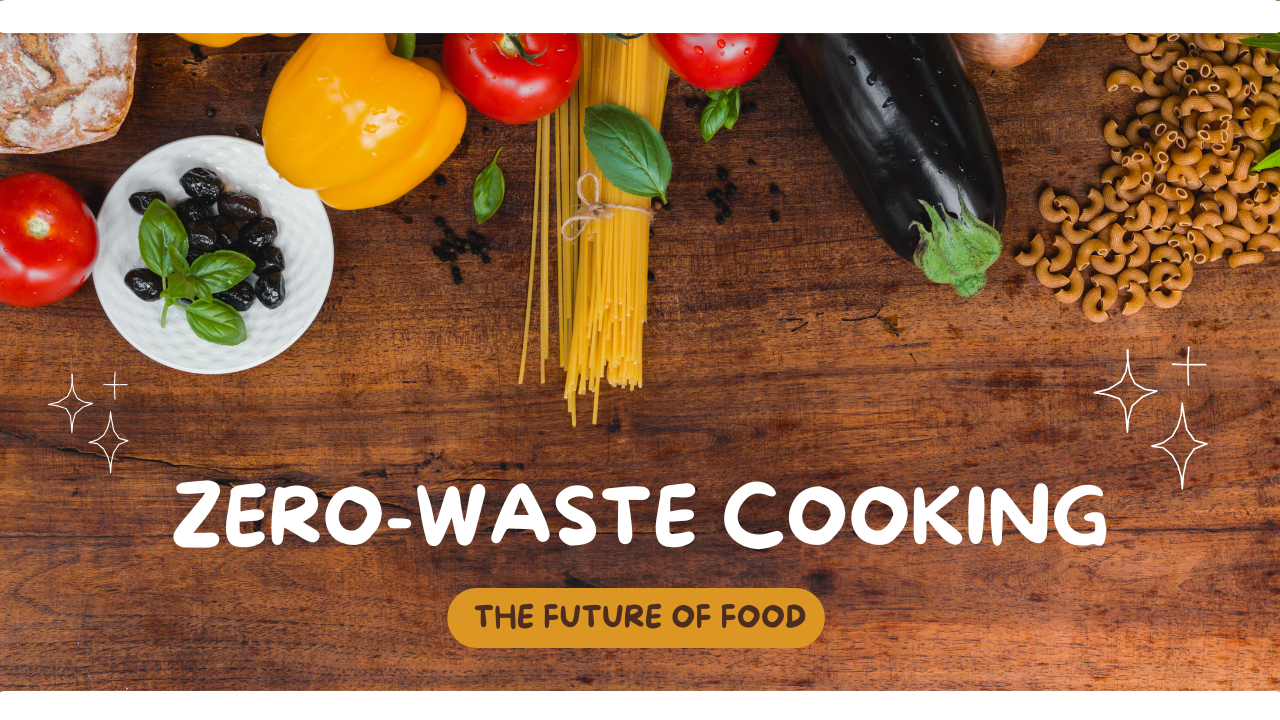Imagine a world where every carrot peel, bread crust, or leftover grain isn’t tossed in the trash but turned into something delicious. That’s the heart of zero-waste cooking, a movement that is revolutionizing how we think about food. Shifting emphasis to sustainable ingredients, creative recipes, and reducing food waste, this approach isn’t just eco-friendly, it’s smarter and tastier than previous methods. Let’s get deep into how zero-waste cooking works, why it matters, and how you can join the movement.
What Is Zero-Waste Cooking?
Zero-waste cooking means using every part of your ingredients, leaving nothing to waste. Think vegetable peels turned into broth, stale bread reborn as croutons, or fruit scraps fermented into vinegar. The goal is simple: send nothing to landfills. This practice saves money, reduces your carbon footprint, and unlocks new flavors.
For instance, do not throw broccoli stems; they can be included in stir-fries or as a soup blending. Even grounds from coffee discarded can grow mushrooms or flavor some desserts. After all, this is just using “waste” as potential resources.
Why Zero-Waste Cooking Matters:
1. Fights Climate Change:
In landfills, rotting food emits methane, a greenhouse gas much worse than CO₂. Composting food scraps or making use of these scraps eliminates that.
2. Saves Resources:
Growing food uses water, land, and energy. Using completely sustainable ingredients wastes fewer resources.
3. Supports Farmers and Communities:
Buying from local producers reduces transportation pollution and supports small-scale farmers.
How to Start Zero-Waste Cooking at Home:
You don’t need fancy tools or a restaurant kitchen to adopt zero-waste cooking. Here’s how to begin:
1. Plan Meals Around What You Already Have:
Check your fridge, pantry, and freezer before grocery shopping. Leftover rice? Make fried rice or rice pudding. Wilting veggies? Toss them into a soup or frittata.
2. Store Food Smartly:
- Keep herbs fresh by storing them in water.
- Freeze overripe bananas for smoothies or baking.
- Store grains and nuts in airtight containers to prevent spoilage.
3. Embrace “Ugly” Produce:
Misshapen carrots or lumpy potatoes taste just as good! Use them in stews, sauces, or roasted dishes where looks don’t matter.
4. Repurpose Scraps:
- Vegetable peels: Simmer into broth.
- Bread crusts: Bake into croutons or breadcrumbs.
- Meat bones: Boil into stock.
- Citrus rinds: Dry for zest or infuse vinegar.
5. Compost What’s Left:
Even tiny kitchen spaces can compost. Put scrap eggshells, coffee grounds, or orange peels into a countertop bin. That compost then benefits the garden or houseplants.
Zero-Waste Cooking in Restaurants:
World cuisines are currently spearheaded by chefs who insist on zero waste. Menus are designed seasonally and by local producers with minimal waste, like fish bones transforming into mouth-watering broths and the peels from fruits infusing syrups in cocktails. Kitchens sometimes use apps that help them reduce waste, and this saves money while reducing garbage.
These restaurants are the epitome of proof that sustainability and gourmet meals do coexist. Such dishes as marinated pumpkin or caramelized apple desserts prove how creativity turns “scraps” into stars.
Technology in Diminishing Food Waste:
The ease of being a zero-waste cook comes with apps and tools. Such apps include:
- Food waste trackers: These can measure scraps to indicate waste patterns
- Composting guides: These can teach you how to compost at home
- Recipe generators: By plugging leftover ingredients, the apps give a recipe.
Even small moves, such as monitoring your kitchen waste, make big savings and less trash.
The Future of Food: Zero-Waste Trends:
1. Upcycled Foods:
Companies are turning “waste” into new products, think snack bars made from fruit pulp or flour from spent coffee grounds.
2. Circular Food Systems;
Farmers, restaurants, and homes collaborate to ensure nutrients return to the soil in the form of compost, looping resources back into use.
3. Plant-Based Menus:
They just naturally use less and produce less waste.
Conclusion:
Zero-waste cooking is not a passing trend, but the future of food. We can reduce our environmental impact by reusing scraps, promoting local producers, and embracing sustainable ingredients. A home cook, or professional chef, or even small steps such as composting leftovers or repurposing them are a big step toward the protection of the earth. Let’s cook smarter and waste less on our way to a better world-one meal at a time.
FAQs:
1. What is zero-waste cooking?
Using every part of ingredients to avoid waste.
2. How do I start zero-waste cooking?
Repurpose scraps, plan meals, and compost.
3. Can I compost without a garden?
Yes! Use a small bin for houseplants or community gardens.
4. What are “upcycled foods”?
Foods made from ingredients that would otherwise be wasted.
5. Why buy from local producers?
Reduces transport pollution and supports farmers.
6. Is zero-waste cooking time-consuming?
No—simple habits like saving scraps add minutes to your routine.
